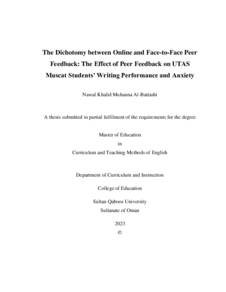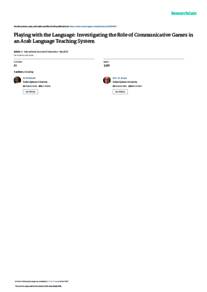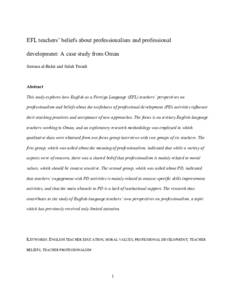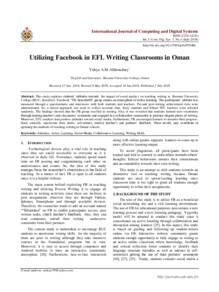Document
The Dichotomy between online and face-to-face peer feedback : the effect of peer feedback on UTAS Muscat students’ writing performance and anxiety.
Source
Master's thesis
Other titles
الفروقات بين تأثير التغذية الراجعة للأقران : إلكترونيا ووجها لوجه على مستوى الكتابة والقلق لدى طالب جامعة التقنية والعلوم التطبيقية
Country
Oman
City
Muscat
Publisher
Sultan Qaboos University
Gregorian
2023
Language
English
Thesis Type
Master's thesis
English abstract
The present study investigated the effect of two modes of peer feedback, online and faceto-face, on UTAS Muscat level 4 students' argumentative writing performance and second
language writing anxiety. The research design opted for is quasi experimental, where the
randomly selected groups (N= 124) were divided to three: control, face-to-face and online.
Two main data collection instruments were used. To identify the students' second language
writing anxiety levels prior and post the experiment, an instrument titled the Second
Language Writing Anxiety Inventory (SLWAI) was adopted from (Cheng, 2004). To
determine the students' argumentative writing performance, a posttest and a pretest were
designed and employed to fulfill the purpose. The intervention’s duration was a four-week
period. Peer feedback was applied on four in-class written essays. In terms of the results,
both modes of peer feedback appeared to be effective in improving the students' writing
performance and second language writing anxiety. As for the control group, their
argumentative writing performance has improved, while their second language anxiety
levels remained high. The study's implications indicate that face-to-face peer feedback is
more effective to promote a better argumentative writing performance level, while online
peer feedback is recommended for reducing second language writing anxiety levels. Future
research can be conducted on a bigger scale, a different local context and on different
language skills such as reading, listening and speaking.
Category
Theses and Dissertations




